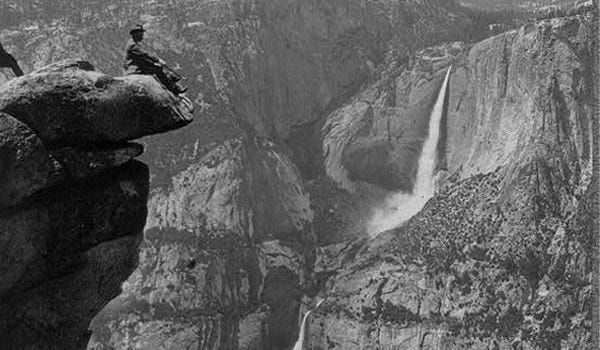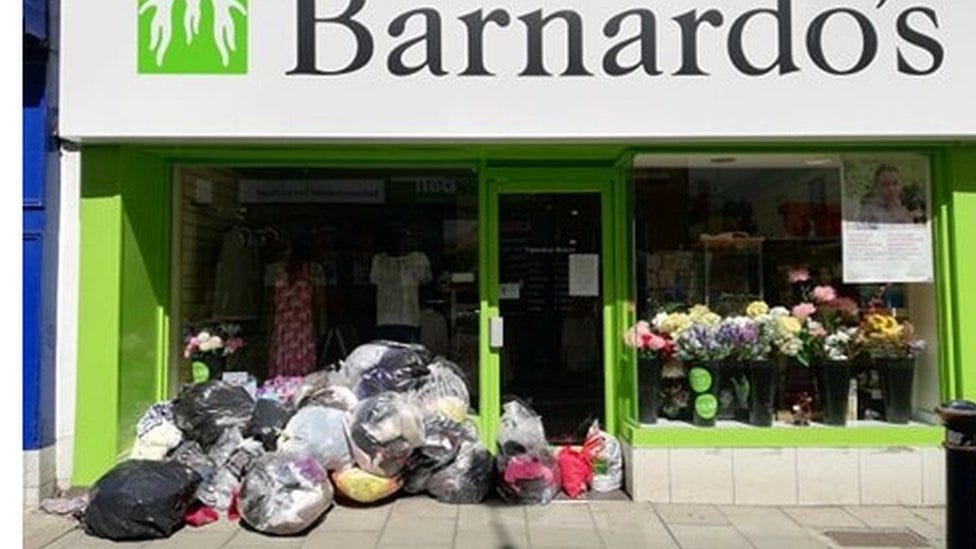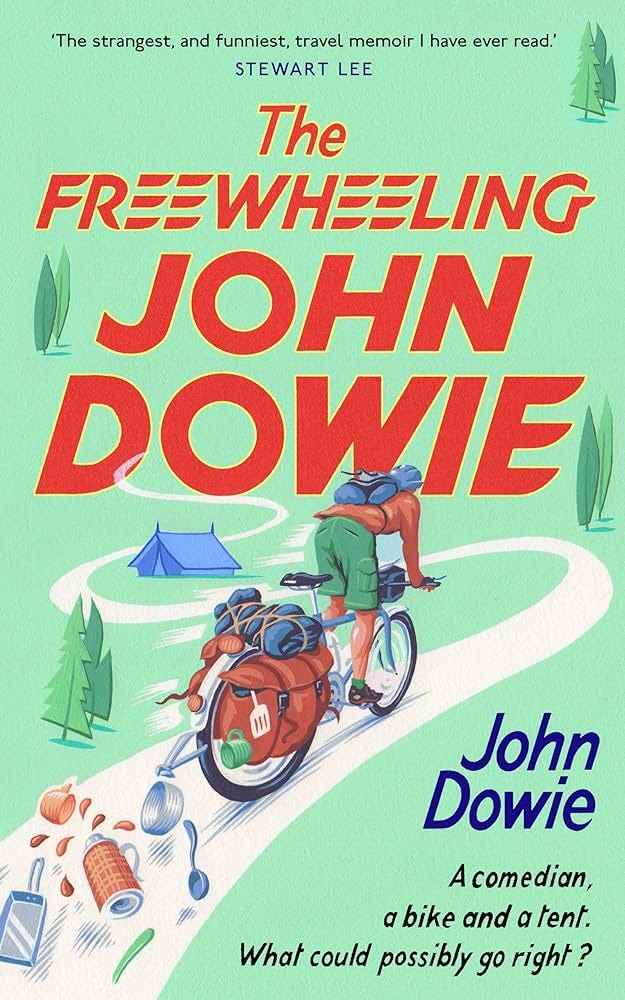Hello, one and all.
This is New Escapologist, the free newsletter from the magazine of the same name. Here we rail against the work ethic, replacing it with ethics of our own. We make and act upon escape plans.
Our sixteenth print edition is painfully close to completion. There’s just a last stretch of editing to get through and then it’s off to the printer. Click, click, swish, click, click! But don’t wait for the printer to grind into life, order a copy here. Subscribe even! Issues 14 and 15 are sold out (though some, of course, may be found at these shops in the real world).
Willkommen. Bienvenue. Welcome to the newsletter.
Time Too Precious
Do you remember mountaineer John Muir? Why, of course you do. He said “the mountains are calling and I must go.”
Well, his friend William Badè said this about him:
[John] concluded that life was too brief and uncertain, and time too precious, to waste upon belts and saws; that while he was pottering in a wagon factory, God was making a world; and he determined that, if his eyesight was spared, he would devote the remainder of his life to a study of the process.
Eyesight spared? Wikipedia explains:
In early-March 1867, an accident changed the course of his life: a tool he was using slipped and struck him in the eye. The file slipped and cut the cornea in his right eye and then his left eye sympathetically failed. He was confined to a darkened room for six weeks to regain his sight, worried about whether he would end up blind. When he regained his sight, “he saw the world—and his purpose—in a new light”. Muir later wrote, “This affliction has driven me to the sweet fields. God has to nearly kill us sometimes, to teach us lessons.” From that point on, he determined to “be true to [himself]” and follow his dream of exploration and study of plants.
Escape! When work almost ruined him, John Muir was still for awhile, then answered the call of the hills.
Dreamer John:
The World Seen Through Social Media Isn’t Real
Speaking of “time too precious,” a particularly topical drain on time (i.e. human life) is social media. I’m trying not to write about it so much anymore but I can’t help it. Since escaping the big platforms a few months ago, I keep noticing new things and wanting to tell people about it all.
I’m not telling you what to do, honestly. I’m inviting you to think about it and, if you want to, to gradually and calmly, piece by piece, extract yourself from the tangle in which you’ve found yourself. They kidnapped your time and attention gradually and calmly, piece by piece. That’s the way to leave too. You won’t regret it.
This piece is quite long so I won’t put it all in the newsletter, but you can read the whole thing, if you want to, at the blog. Here’s where to go. x
Cheap Bricks
Friend Marcus sends us a news item about the Chinese housing crisis. It’s a bit like the UK housing crisis and the American housing crisis and the Australian and New Zealand housing crises.
Young Chinese people have found that you can buy a home for as little as £3,500 outside the city limits. This is in comparison to property in Beijing, which is completely unaffordable even if you work every hour Chinese God sends.
What’s interesting to me is (a) the light bulb moment of these clever kids running the sums and realising that hard work doesn’t pay and (b) the realisation of an alternative.
The escape plan would be to move to the cheaper location while remote-working for a Beijing company for Beijing wages and saving the surplus for a few years. It’s our old friend geo-arbitrage without even leaving your country.
It’s something I’ve thought about doing myself. Instead of living in Glasgow, I could live in Port Glasgow (about twenty miles from where I currently live), the only downside being that it’s absolutely horrible. But it could cost as little as a grand, deftly avoiding both homelessness and the rent trap or a big mortgage. Then I could write books and, instead of starving while doing so, get fat.
How to Get Rid of Things
If you’re trying increase your freedom by downsizing or if you just want to benefit from minimalism in general, you’ll sooner or later enter the phase of “getting rid of things.”
What’s the best way to get rid of things? I mentioned that this guy was wasteful in getting rid of things quickly by taking them to charity shops or the tip.
Charity shops, I’m sorry to tell you, will probably also take your things to the tip. Or leave them outside the shop in garbage bags ready to be taken to the tip. Charity shops are overburdened with donations. Only the finest junk will make it onto their shelves. Besides, charity (in the sense of large businesses positioning themselves as middlemen) sucks. We need social reform, not charity. I like the idea that they keep used-but-useful goods in circulation, but they’re increasingly crap at this.
So, here are the best ways to get rid of stuff, in order:
1. Don’t acquire it in the first place. This is too late if you’re currently purging, but it’s worth remaining vigilant to acquisition. Getting rid of stuff is only one side of minimalism; the other and arguably most important side is to not buy or otherwise acquire things to begin with. You can adopt a minimum acquisition ethic any time and future purges will be less onerous.
2. Sell it in person to non-charitable second-hand shops (especially book and music shops). This is good for batches of things, makes money for yourself, and keeps used-but-useful things in circulation.
3. Sell it in person via Craigslist or Gumtree or similar. People will collect if you make it clear that you won’t deliver. Top tip: charging a token amount of money means people take the transaction more seriously than if you list it for free (collectors of free junk often never turn up). Selling is generally better than giving away for free, not just because you’ll make useful beer (or escape fund) money but also because the thing you’re getting rid of will go to someone who actually wants or needs it instead of greedily accepting something just because it’s free and sticking it uselessly in a cupboard or on a big pile of other hoarded junk.
4. Sell it online with eBay, Etsy, Vinted, Depop, etc. You’ll get the market value for whatever you’re ditching, but this isn’t as good as in-person selling because (a) it will involve a trip to the post office and (b) you’ll miss out on local economies (i.e. talking to someone who lives nearby, keeping value in local circulation instead of sending it inevitably to the largest population centres, and it cuts out Silicon Valley. But this works too.
5. Leave it where it can be taken for free: a community givebox is ideal but a dry street corner can work too. Check back to make sure it’s been taken: don’t be a posh fly-tipper.
6. Give it away for free with Freecycle, Craigslist or Gumtree but see reservations in 3 and 4 above.
7. Donate it to a charity shop in the hopes that they won’t bin it.
8. Give it to a friend. This is good and avoids the charity shop problem, but they might only take it to be kind to you (rather than really wanting or needing it) and it will still be in your personal/social ecosystem and therefore potentially retrievable or psychologically still part-owned; better to ditch it more thoroughly.
9. Smash it up and put it in the bin. Which is less effort than:
10. Take it to the tip. Ideally on foot (see my walk review in Issue 14) so as not to stink up the world with your disgusting car fumes. When junking something, remember it will be dead forever and any value that might still be extracted from it will be gone. The profit of binning something or taking something to the tip is pure ullage: the valuable absence or emptiness that will take that object’s place.
General guidance when getting rid of stuff: do it gradually, not in one big purge. You’re less likely to dispose of things productively or thoughtfully when trying to purge quickly.
The Escapes of John Dowie
In February I read The Freewheeling John Dowie, the wise and funny memoir of a comedian who ditched the conventional notions of career success, sold his home and all of his stuff, and took to the open road with a bicycle. I found the book utterly compelling and I probably found my “book of the year” rather early.
He writes in the first chapter about his early brushes with employment. He mopped floors and answered phones but the funniest bit is when he works in a branch of W H Smith (which, coincidentally, I also did, albeit in 1999 rather than 1966):
“When you work for W H Smith,” the twenty-year-old in charge of the paperback department told me proudly, “you’ve got a job for life.”
Apart from the chilling horror such a statement generates…
He lasts nine months at Smiths before seeing a Spike Milligan play Wolverhampton and deciding to become a comedian.
So he concocts a simple escape plan: work and save until you have enough money to put on a comedy show at the Edinburgh Fringe. And then he does it:
After three months of two jobs and very little sleep I managed to raise the money I needed – about £500. I took myself to Edinburgh, performed every day for three weeks, returned to Birmingham with a vastly improved act, got myself an Arts Council Grant and, I’m happy to tell you, haven’t done a day’s work since.
When comedy itself started to feel like a job, Dowie looked for more freedom. He sold everything. His friend Stewart Lee writes:
Each time I [visited], Dowie had less stuff. In the end he had reduced his possessions to five basic food groups; records by Bob Dylan and Moondog; books by William Blake and [Philip K] Dick; and some Batman comics. It was as if he was preparing to depart. And pretty soon he did. No-one in our gang knew where he’d gone, but we knew he could now carry everything he ever wanted in a backpack, and he’d bought a bike.
And in Freewheeling, Dowie writes of his minimalism:
At first I thought that getting rid of the vinyl I’d been collecting since the Sixties would be a wrench. But, with each cardboard box that [the record dealer] packed, carted off and placed in his car, I felt a lightening of the spirit. It lightened even more when he paid me. Several hundred quid. I was astonished. I’d been hoping for a tenner.
Speaking of money, it cost a pretty penny for me to get a copy of Freewheeling, even though it was only published in 2018. Luckily, my copy was badly damaged in the post and I was able to get a refund, reading it in the end for free. Take that, Music Magpie!
Anyway, I sent Dowie some fan mail about how much I loved his book. I couldn’t help myself. When he explained that the rights had reverted to him since the book went out of print, I pulled some strings and levers to get it re-published, albeit only as an e-book for now. You can buy it here for a tenner and I recommend that you do!
Meanwhile, in 2010
2010 was a long time ago. 14 years! Brexit, Trump, Covid and Starmer were all but twinkles in Beelzebub’s eye. Truly, it was another world.
Here’s a TED talk from that time, urgently outlining why having offices in the Age of the Internet is insane and what benefits might come from working at home instead.
“WFH” is something we all know about in 2024, and yet the concept of bussing off to an office at Horrid O’ Clock every morning still isn’t quite dead.
2010 guy explains how people need uninterrupted stretches of quiet time to get things done, to be creative. People cite, he says, places like “the porch, the kitchen, a spare room, the coffee house, the library” when they really need to apply themselves. They never mention the office.
The office is full of counterproductive and disruptive practices like stop-and-chats and background noise and sudden meetings. He explains how the “distractions” feared by managers (such as their people slacking off to watch TV or take a nap) are nowhere near as bad as the distractions inherent to the office.
Here in 2024, progress has been made on that one particular front. It’s good that managers are finally coming around to WFH, freeing millions of people from lives of daily commutes and shithouse offices.
And yet there’s still so much scepticism worthy of 2010, usually in the form of the same old non-arguments. These non-arguments reveal the truth of what so many managers and employers really want: control over other human beings.
WFH isn’t as good as a proper escape. But it’s a great halfway house. While keeping your income from employment, WFH eliminates so many of the things that make work awful: the commute, the office environment, having to be in a particular place at a particular time, the inability to run personal errands or take a few moments to recuperate, and seeing your boss’s stupid scalding face all the time.
Letter to the Editor: Chilling Stuff
To send a letter to the editor, simply write in. You’ll get a reply and we’ll anonymise any blogged version.
Reader C writes:
Dear Robert
Thanks for the recommendation of The Financial Lives of the Poets by Jess Walters, which I got from the library. Chilling stuff, especially this sentence:
We had some normal debt: normal credit cards, normal furniture layaways, normal car payments, some uncovered medical bills, Teddy’s normal braces and Franklin’s normal speech therapy…
Have you seen the new Wim Wenders film Perfect Days? It’s about a solitary, but not lonely, Japanese man who lives a simple life in Tokyo. It’s beautifully made and very well acted. It has some pro-work tropes (romanticising repetitive work and the dignity of a job done well) but I think its main message is Escapological.
He works in order to pursue his loves of reading second-hand books, listening to cassettes, and taking photos of trees. He only displays anger when his boss asks him to work a double shift, and he’s clearly inspiring his wealthy niece to escape from the capitalist rat race.
Doing all of this in the shadow of the hyperconsumerism of Tokyo is particularly powerful. He’s certainly a more inspiring hero than Jess Walters’ Matt.
Yours in glorious slowness…
*
Hello C.
Yes indeed! Perfect Days is a wonderful film and I second your recommendation of it for the benefit of our readers.
In fact, I have reviewed the film along with a similarly-but-differently Escapological new film called The Delinquents in the forthcoming Issue 16.
And that’s another fine month you’ve got me into. Happy May, everyone. Don’t forget that May is the month in which to REBEL against bosses, masters and overlords. Do this. But it’s also the month for cleaning your house. So clean REBELLIOUSLY.
Or re-visit my old tips for avoiding housework. Either way.
Your friend and neighbour,
Robert Wringham
Editor, New Escapologist
www.newescapologist.co.uk







